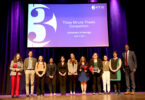Athens, Ga. – A website for journalists covering poverty on any beat just got better. Version 2.0 of “Covering Poverty: A Toolkit for Journalists” went live on Tuesday, July 13. It was created and is maintained by the University of Georgia Grady College of Journalism and Mass Communication.
Improvements include: a sign-up for the weekly list of story ideas sent by email; recent examples of best-practice coverage across seven reporting beats; and links to the site’s social media tools.
“The improvements were driven by suggestions from user journalists,” said John F. Greenman, Carter Professor of Journalism, one of the site’s developers.
The site, located at www.grady.uga.edu/poverty, is the centerpiece of the Carter Program’s training outreach to journalists.
The weekly list of story ideas was developed and tested over the last academic year by graduate student Johnny Elder. Some 30 journalists have signed up for the service. The list typically includes five-to-seven ideas, drawn from think-tank studies, government reports and best-practice coverage by other journalists.
Recent graduate Carolyn Crist researched the examples of best-practice coverage. Crist developed three examples for seven reporting beats, each with step-by-step “how you can do it” information.
Nearly 200 journalists follow the site on Twitter. Tweets typically highlight recent coverage of poverty.
“Our goal is to provide journalists with resources that will improve coverage of poverty on any beat for any media,” said Diane H. Murray, Grady’s director of public service and outreach, one of the site’s developers.
The site grew out of a 2008-2009 “Poverty and the Economy” research grant from the University of Georgia Research Foundation administered by the UGA Office of the Vice President of Public Service and Outreach. Greenman and Murray were the grant’s co-principal investigators.
Eight UGA faculty members from the College of Family and Consumer Sciences, the Carl Vinson Institute of Government, the department of speech communication, the department of agricultural and applied economics, and the Grady College contributed site tutorials.
A key partner in the project is Patricia Thomas, Grady College’s Knight Chair in Health and Medical Journalism. Thomas wrote the tutorial on covering poverty and heath and co-sponsored specialized reporting conferences on Latino migration and prison health.
Established in 1915, the Grady College of Journalism and Mass Communication offers undergraduate majors in advertising, broadcast news, magazines, newspapers, public relations, publication management and telecommunication arts. The college offers two graduate degrees, and is home to WNEG-TV, the Knight Chair in Health and Medical Journalism and the Peabody Awards, internationally recognized as one of the most prestigious prizes for excellence in electronic media. For more information, see www.grady.uga.edu or follow Grady on Twitter at twitter.com/ugagrady.







